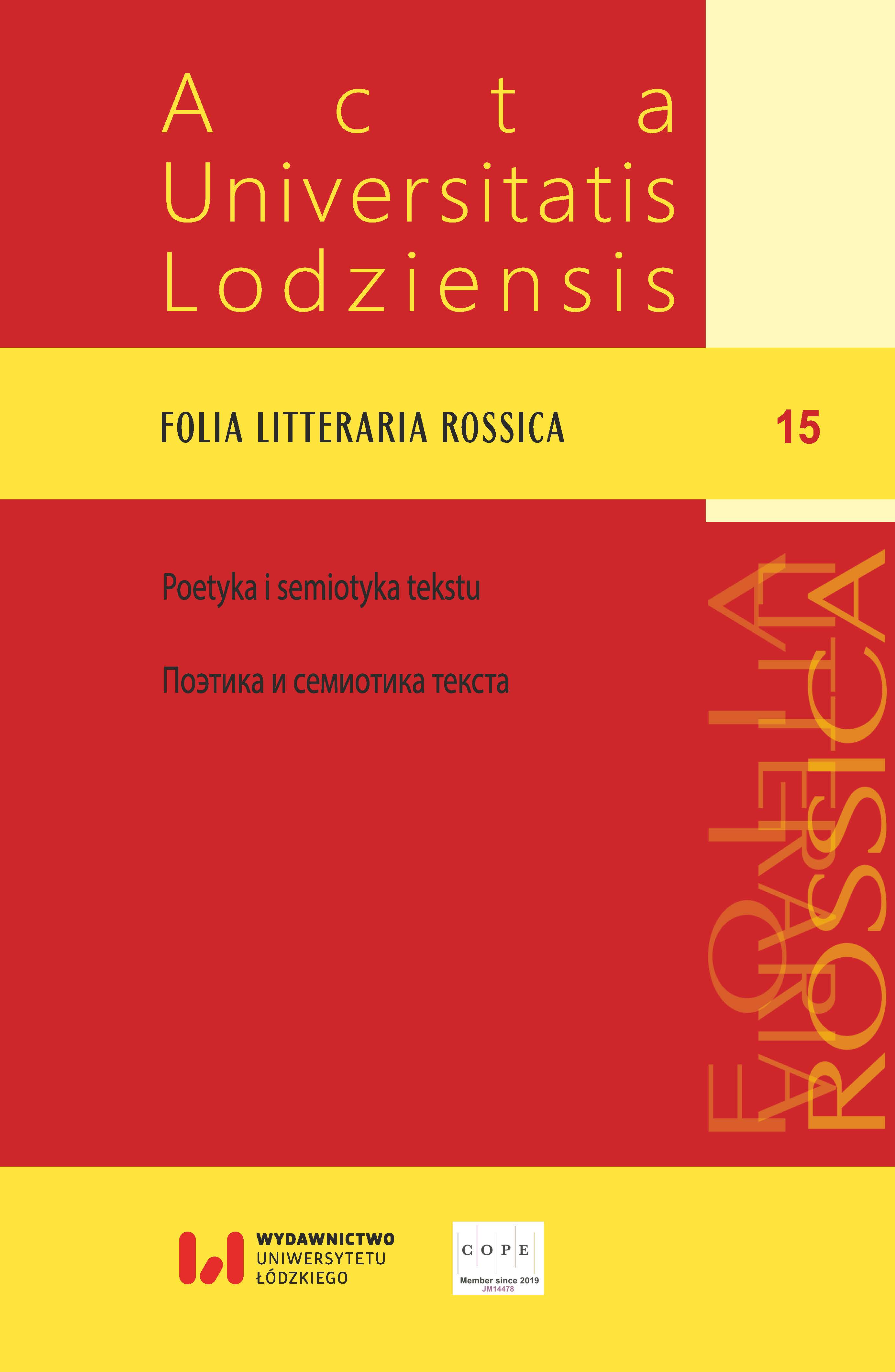An Experience in Analyzing Civil Lyrics (“Snake Island” by Dmitry Bykov)
DOI:
https://doi.org/10.18778/1427-9681.15.02Keywords:
poetics, three-foot anapest, meter’s memory, Dmitry Bykov, civil lyricsAbstract
The article analyses Dmitry Bykov’s poem “Snake Island”, an example of essential civil lyrics. The text was first published on the “Novaya Gazeta” website on February 26, 2022, two days after the Russian army’s intrusion to Ukraine and seizure of Snake Island. Writing his poem, the author proceeded from the early (luckily wrong) info on the death of the island’s defenders. This defined the heroic ring of the piece (which is determined by the epigraph alluding to an episode of the Waterloo battle described in Part 2 of “Les Misérables” by Victor Hugo) and its anti-emperial focus. The semantic associations are motivated by the intonation of the three-foot anapest with the AbAb rhyming scheme. The poem shows similarities with the texts written by Nikolay Ogarev, Nikolay Nekrasov, Nikolay Gumilev, Osip Mandelstam, Timur Kibirov. The toponym “Snake Island” hints on the key zoological metaphor whose negative sense traces back to the biblical Christian concept of the snake as an embodiment of Satan. Hence the monstrosity of this chthonic creature that can only be terminated if you throw a shell to its open mouth. Persona’s rejection of the motherland captured by snakes goes along with self-identification with the island’s defenders, Ukrainian border guards. A border guard is a maverick with regard to the protected area (Lat. marginalis – standing on the edge). And if his homeland is attacked by a “superpower” whose image is labeled by “a nameplate, a sheepskin hat and a scaffold”, then the reaction to this intrusion will only be an imperative utterance containing an obscene rhyming word. Moreover, if almost the whole text retains demarcation of the subjects, the final quatrain reveals subject syncretism. Alienable both ideologically and stylistically, a Russian man-of-war is attributed as “my”. Hence combination of a civic stance and a personal intonation, both filling the text of poetry with the consciousness of moral rightness.
Downloads
References
Afanasev, Yurii N. Opasnaya Rossiya: traditsii samovlastiya segodnya. Moskva: Rossiiskii gosudarstvennyi gumanitarnyi universitet, 2001.
Google Scholar
Baevskii, Vadim S. Nikolai Gumilev – master stikha. In: Nikolai Gumilev: Issledovaniya i materialy. Bibliografiya. Posvyashchaetsya pamyati Lva Nikolaevicha Gumileva. Sankt-Peterburg: Nauka, 1994: 75–103.
Google Scholar
Blok, Aleksandr A. Sobranie sochineniy: v 8 t., ed. V. N. Orlov. Vol. 1. Moskva; Leningrad: Gosudarstvennoe izdatelstvo khudozhestvennoy literatury, 1960.
Google Scholar
Bykov, Dmitrii L. Ostrov Zmeinyi. https://novayagazeta.ru/articles/2022/02/26/dmitrii-bykov-ostrov-zmeinyi
Google Scholar
Bykov, Dmitrii L. Otchet: Stikhotvoreniya. Poemy. Ballady. Moskva: PROZAiK, 2012.
Google Scholar
Chukovskii, Kornei I. Nekrasov, kak khudozhnik. Peterburg: Epokha, 1922.
Google Scholar
Gasparov, Mikhail L. O. Mandelshtam: Grazhdanskaya lirika 1937 goda. Moskva: Rossiiskii gosudarstvennyi gumanitarnyi universitet, 1996.
Google Scholar
Gasparov, Mikhail L. Ocherk istorii russkogo stikha: Metrika. Ritmika. Rifma. Strofika: uchebnoe posobie dlya studentov vuzov, obuchayushchikhsya po filologicheskim spetsialnostyam. Moskva: Fortuna Limited, 2000.
Google Scholar
Gumilev, Nikolai S. [Perevody stikhotvornye]. In: N. S. Gumilev. Pisma o russkoi poezii. Moskva: Sovremennik, 1990: 69–74.
Google Scholar
Gumilev, Nikolai S. Stikhotvoreniya i poemy, ed. M. D. Elzon. Leningrad: Sovetskii pisatel, Leningrad. otdelenie, 1988.
Google Scholar
Gura, Aleksandr V. Zmeya. In: Slavyanskie drevnosti: etnolingvisticheskii slovar: v 5 t., ed. N. I. Tolstoi. Vol. 2. Moskva: Mezhdunarodnye otnosheniya, 1999: 333–338.
Google Scholar
Hugo, Victor. Sobranie sochinenii: v 15 t., ed. V. N. Nikolaev, A. I. Puzikov, M. S. Treskunov. Vol. 6. Moskva: Gosudarstvennoe izdatelstvo khudozhestvennoy literatury, 1954.
Google Scholar
Kampaniya 2022 goda na ostrove Sneyk. https://translated.turbopages.org/proxy_u/en-ru.ru.e28ff8d8-62ee87c4-fcabf934-74722d776562/https/en.wikipedia.org/wiki/2022_Snake_Island_campaign
Google Scholar
Kibirov, Timur Yu. “Kto kuda – a ya v Rossiyu…”. Moskva: Vremya, 2001.
Google Scholar
Leybov, Roman G.; Lekmanov, Oleg A.; Stupakova, Elena Yu. “Gospod! Prosti Sovetskomu Soyuzu!”: poema Timura Kibirova “Skvoz proshchalnye slezy”: opyt chteniya. S prilozheniem stati M. Sverdlova. Moskva: OGI, 2020.
Google Scholar
Maller, Larisa M. Semanticheskaya oppozitsiya “daktil – anapest” v rannei poezii A. Bloka. In: Modeli kultury: mezhvuzovskii sbornik nauchnykh trudov, posvyashchennyi 60-letiyu professora V. S. Baevskogo. Smolensk: Smolenskii gosudarstvennyi pedagogicheskii institut im. K. Marksa, 1992: 65–79.
Google Scholar
Mandelshtam, Osip E. Polnoe sobranie stikhotvorenii, ed. A. G. Mets. Sankt-Peterburg: Akademicheskii proekt, 1995.
Google Scholar
Mikhaylova, Yuliya N.; Chzhao, I. “Kulturnye konnotatsii zoonimov v russkoi i kitayskoi frazeologii”. Izvestiya Uralskogo federalnogo universiteta. Seriya 2. Gumanitarnye nauki. Vol. 18, No 4 (157) (2016): 168–181.
Google Scholar
Nekrasov, Nikolai A. Polnoe sobranie sochinenii i pisem: v 15 t., ed. F. Ya. Priyma. Vol. 2. Leningrad: Nauka, 1981.
Google Scholar
Ogarev, Nikolai P. Izbrannye proizvedeniya: v 2 t. Vol. 1. Moskva: Gosudarstvennoe izdatelstvo khudozhestvennoy literatury, 1956.
Google Scholar
Sokolov, V. Eto vechnoe stikhotvorenie…: kniga stikhov. Moskva: Izdatelskii dom Literaturnaya gazeta, 2007.
Google Scholar
Storozhenko, Nikolai. “Baika pro «russkii voennyi korabl» stala porazheniem Ukrainy”. Vzglyad: delovaya gazeta 2022, 21 marta, https://vz.ru/world/2022/3/21/1149178.html
Google Scholar
Timur Kibirov. Buklet premii “Poet” 2008 goda. https://poet-premium.ru/laureaty/kibirov_buklet.html
Google Scholar
Znamenskii, Pavel. Pochemu dyavol prinyal obraz zmeya? https://azbyka.ru/forum/xfa-blog-entry/pochemu-djavol-prinjal-obraz-zmeja.464/
Google Scholar
Downloads
Published
How to Cite
Issue
Section
License

This work is licensed under a Creative Commons Attribution-NonCommercial-NoDerivatives 4.0 International License.












